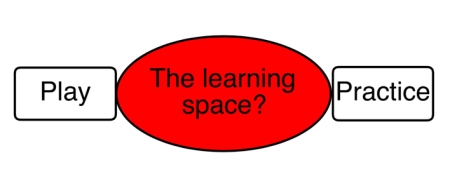Johan Cruyff, soccer world champion and coach, in an interview about development in (children’s) sports using soccer as an example. About creativity in and through free play, the necessity of mistakes in the learning process. Modern sports, education and exercise concepts such as the Ballschule Heidelberg or Street Racket are looking for and offering ways back to the culture of street games or bringing street games into the halls.
Schlagwort-Archive: motor learning
Der Mythos der korrekten Technik

Ein Beitrag von outoftheb-ox über die Theorie der Entwicklung motorischer Fähigkeiten, den Mythos der korrekten Technik, Variabilität im Körper und Variabilität in der Bewegung.
Fazit: „Bewegungsvariabilität sollte im Training gefördert werden, um die Anpassungsfähigkeit von Bewegungslösungen zu verbessern und folglich nicht nur die sportliche Leistung der Sportlerin zu steigern, sondern auch das Verletzungsrisiko zu verringern. Das Üben einzelner Bewegungen zum Erlernen der “korrekten Technik” sollte vermieden werden. Stattdessen empfiehlt es sich das Training in einer realitätsnahen Situation durchzuführen, die es der Sportlerin erlaubt Umweltfaktoren wahrzunehmen und auf diese agil und variabel zu reagieren.“
„Essentially, all models are wrong, but some are useful“
George Box
Set it free

How motor learning works
Learning needs good sleep
Surely you have players that are impatient in practice and matches. Things should happen immediately. But you are convinced that learning implicitly and differentially is sustainable and more efficient. Of course this requires the confidence of coach and player himself in his „self-organization ability“.
By the coach suscribed solutions are often only short-term „false solutions“. Learning processes find place in such practice, but they are not directly  sustainably implemented generally.
sustainably implemented generally.
Let them fill it with life…
 Very interesting comment about constraints led coaching in soccer with some nice examples about changing rules and environment:
Very interesting comment about constraints led coaching in soccer with some nice examples about changing rules and environment:Executive functions and games
Do it hard, but game like!
Hat nur indirekt was mit INNER COACHING (TMS) zu tun, aber die Videos von trainugly und Trevor Ragan sind immer inspirierend und (lern-)motivierend!
Train Ugly Manifesto
Stop thinking…
“Any athlete will tell you this: If you’re competent at something and you start thinking about it, especially at a detailed level, you’re just dead in the water,“ said UC Santa Barbara systems neuroscientist Scott Grafton, who has puzzled over motor learning for two decades.
Learn to move
 Dies ist einmal mehr ein kleiner Exkurs. Ihr erinnert Euch vielleicht daran, dass wir darauf hingewiesen haben, wie Kinder Gehen lernen oder Sprachen lernen und dass wir dies mit unseren Ideen zum Bewegungslernen und im speziellen zum Lernen von sportlichen Bewegungen verbinden. Karen Adolph, Universität New York, beschreibt in diesem Video, wie Kinder Gehen lernen.
Dies ist einmal mehr ein kleiner Exkurs. Ihr erinnert Euch vielleicht daran, dass wir darauf hingewiesen haben, wie Kinder Gehen lernen oder Sprachen lernen und dass wir dies mit unseren Ideen zum Bewegungslernen und im speziellen zum Lernen von sportlichen Bewegungen verbinden. Karen Adolph, Universität New York, beschreibt in diesem Video, wie Kinder Gehen lernen.
This is once again a small excursion. You may remind that we have pointed out how children learn walking or learn languages and that we combine this with our ideas about motor learning and in particular about learning sports motion. Karen Adolph, New York University, describes in this video how children learn to walk.


